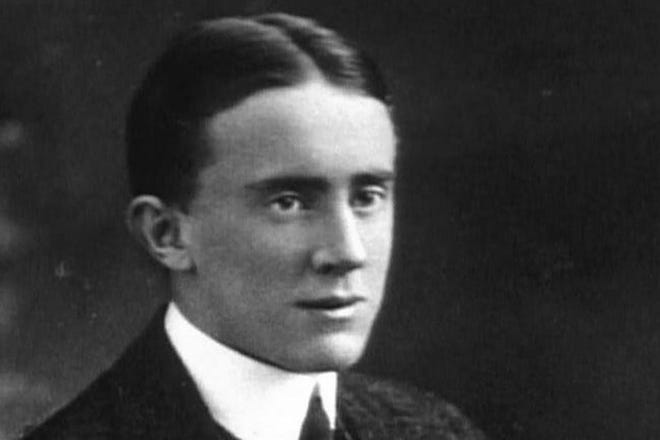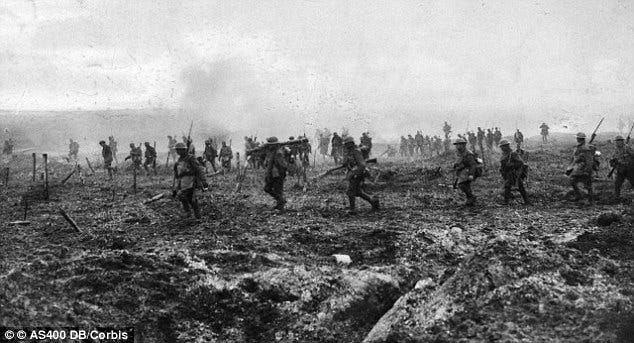CS Lewis and JRR Tolkien: A Friendship that Created Worlds
Part 1: From Childhood to the Battlefield
97 years ago today at a staff meeting at Oxford University, CS Lewis and JRR Tolkien met for the first time. From this bloomed a friendship that would last decades and from which would spring the most enduring fantasy literature worlds of the twentieth century. As part of the Inklings, the literary coterie of which Tolkien and Lewis were the nucleus, they were to fashion “a new narrative of hope amid the ruins of war, industrialization, cultural disintegration, skepticism, and anomie. They listened to the last enchantments of the Middle Ages, heard the horns of Elfland, and made designs on the culture that our own age is only beginning to fully appreciate.”1 In this series I will chart the friendship between Lewis and Tolkien and how from it grew both Narnia and Middle Earth.
Part 1: From Childhood to the Battlefield
John Ronald Reuel Tolkien was born in 1892 in what is now South Africa to English parents. When he was three his father died of rheumatic fever and Tolkien and his mother and brother moved to England. Living in genteel poverty, Tolkien’s mother Mabel taught her sons botany, Latin, French, German, regaled them with fairy tales, and shared with them her deep Catholic faith. When Tolkien was 12 his mother died of diabetes and he and his brother became wards of Father Francis, a Catholic Priest who had been close to their mother and to whom Tolkien was always grateful.
While attending school as a teenager, Tolkien befriended three other boys. The four dubbed themselves the “Tea Club and Barrovian Society,” in reference to their illicit tea-drinking at the local department store (tea was not allowed in their school). The members of the TCBS were as close as brothers and had a passion for the arts. They felt themselves to be called to make a difference in the world, to use their talents to fill people’s hearts with a remembrance of true beauty.
From his earliest years, Tolkien had a rapturous experience of language. They enchanted him and opened him to other worlds – both real and fictional. His genius was already evident - he studied Latin, Anglo-Saxon, Middle English, Finnish, Gothic, Greek, and created fully-realized languages of his own. He went on to graduate from Oxford with first-class honors in English language and literature. He then married the girl he had loved since he was 16, Edith Bratt, in 1916. Three months later, WW1 raging, he was sent to fight in France.
Clive Staples Lewis was born in Northern Ireland in 1898. Raised in a house filled with books, Lewis had an expansive imagination. He and his older brother invented imaginary worlds populated by talking anthropomorphic animals and loved fairy stories. On rare occasions, a piece of music or a line of writing would lift Lewis to the brink of transcendence. He would later term this state “Joy” and likened it to the German word sehnsucht, which is a powerful, bittersweet longing, in which the longing is more desirable than thing being desired. This concept was to be very meaningful in his life.
When he was four his dog Jacksie was hit by a car and killed. Forever after, Lewis insisted he be known as Jack, and, forever after, that was what he was called. When he was 9, despite his fervent prayers that she should be cured, his beloved mother died of cancer. Within weeks, Lewis was sent to a dreadful boarding school in England. Over the course of his education, Lewis became an atheist, saying years later that at that time he did not believe that God existed but was also furious with God for not existing.
Like Tolkien, Lewis’ genius was evident early on. His childhood tutor recognized that Lewis’ translations of Greek were superior to what university graduates were capable of. Lewis was fascinated by fantasy literature, metaphysics, Icelandic sagas, and Norse and Greek mythology. Consistently throughout his life, friends remarked they knew no one who read as widely and as deeply as Lewis
Lewis entered Oxford University in 1917 but mere months later left for France to fight in WW1. He reached the front lines on his 19th birthday.
Arriving at the front lines of WW1 in France’s Somme Valley, Lewis found was a wasteland. Where there had once been green fields there was now an endless vista of mud scarred by miles of trenches. In these trenches, soldiers lived in ankle-deep mud, crawling with lice and fleas, and dodging rats so big that they killed and ate the cats brought in to catch them. The stench of death and human waste was so powerful you could smell the front line miles before you saw it and the moans of the injured, the sick, and the dying filled the air at all hours of the day and night.
There had never been a war like this. New technology like machine guns, tanks, chemical weapons, and airplanes made it horrifying in unprecedented ways. After 5 months in the trenches Lewis wrote about “the frights, the cold, the smell of high explosive, the horribly smashed men still moving like half-crushed beetles.”
In battle Lewis saw his closest comrade killed – blown apart by a bomb – in front of his eyes. Shrapnel from the same explosion ripped into Lewis’s body. One fragment lodged near his heart where it was to remain for the rest of his life.
Tolkien, also serving on the front line, fought in the Battle of the Somme, which was one of the most intense concentrations of killing in human history. The shelling on the first day was so violent that the roar could be heard in London – 200 miles away. He later contracted a case of trench fever, a lice-borne disease, and was invalided to England. Soon after, most of his battalion was killed in battle.
WW1 lasted for 4 years and caused 18 million deaths. Half of the British soldiers fighting in France were either killed or wounded. The war nearly culled an entire generation of men from Britain. Of Tolkien’s beloved childhood friends from the TCBS, all but one was killed. When Lewis returned to Oxford to complete his education, he found that roughly 30% of his former classmates were gone – killed on the battlefields of Europe.
A very telling story comes from Lewis when he was finishing his studies at Oxford. In those years it was popular for students to swim in the river around the university. Lewis said that in the years immediately following the war, the men swimming were marked by scars and no one had to ask where they had come from. But by the end of his student years, a new crop of young men was arriving who could be seen swimming at the river, free of scars. I’ve always thought that image of one generation – scarred physically and mentally – looking upon the younger generation – hale and healthy – so striking.
In the years before WW1, many in the West believed that Western society had things pretty well figured out. They had put aside the supposedly irrational superstitions of yesteryear and were steaming ahead into the modern world where life would be free from the ills that had plagued mankind for so long. World War 1, then, came as a shock. That so many countries that thought of themselves as enlightened could engage in mindless slaughter destroyed the myth of progress for Tolkien and Lewis – the myth that said mankind was evolving past its baser instincts and technology could make war bloodless. The war also killed the traditional way of life: royal families across Europe tumbled from power, revolutions spread like wildfire, social mores dissolved, and the world in many ways seemed to be in free fall.
In the face of this, many of Tolkien and Lewis’s generation in Britain succumbed to cynicism, nihilism, and hedonism. There was an utter loss of belief in the values of Western civilization. Traditional morals and religious virtues were seen as a thing of the past, worthy of contempt. The point now was to overthrow convention and live only for the moment, seeking pleasure wherever you could find it. Atheism was celebrated by the intelligentsia who scorned tradition and reveled in art designed to shock and disgust. Life, it seemed, had been proven hollow and nonsensical, so it was believed art should reflect that.
After the war, Lewis resumed his studies at Oxford and graduated with a triple 1st in Classics, English, and Philosophy. Soon, both Lewis and Tolkien were to become members of the faculty at Oxford. While they were both to carry a lifelong weight of sorrow from the war and the senseless loss of so many of their generation, a weight that would be evident in their writing, they nevertheless charted a different path than the rest of their generation.
The next installment of this series will bring us to the fateful day when Lewis and Tolkien meet and the stage is set for the most pivotal moment in Lewis’ life…
Philip Zaleski, Carol Zaleski. “The Fellowship: The Literary Lives of the Inklings: J.R.R. Tolkien, C. S. Lewis, Owen Barfield, Charles Williams.” 2016 Farrar, Straus and Giroux








> Of Tolkien’s beloved childhood friends from the TCBS, all but one was killed.
By the time I got to this part my heart actually sank - beautifully written piece.